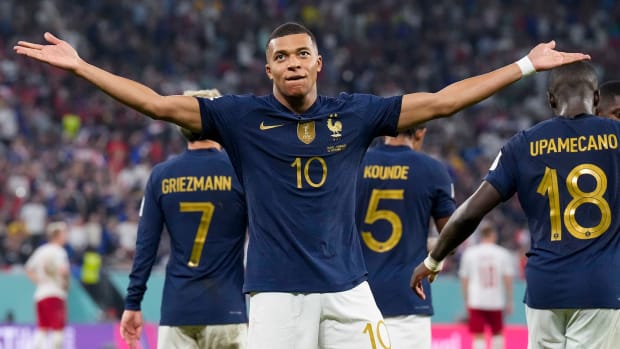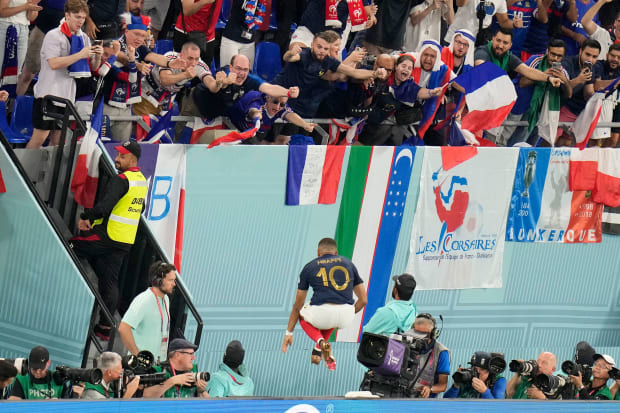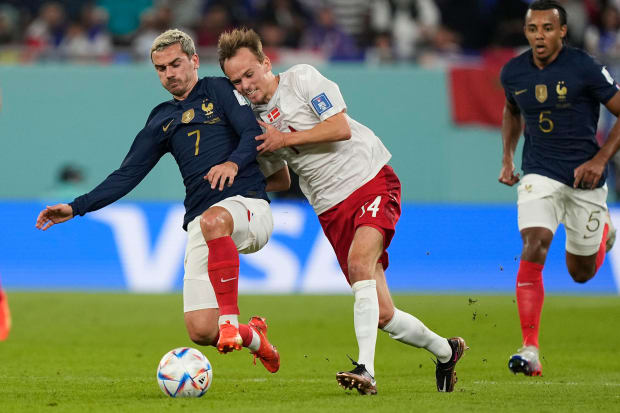DOHA, Qatar—The recent World Cup winners’ curse seems like something that was tailor-made for France.
This is a country whose national teams are immensely gifted, but which has experienced as much epic, soap-opera style failure as memorable success. Les Bleus always seem to be dribbling along that razor thin barrier between legend and ignominy. And it’s a program that has a habit of tempting fate, pushing the locker room chemistry envelope in order to take full advantage of its outrageous conveyor belt of talent. France doesn’t need additional sources of bad mojo.
Since Brazil returned to the 1998 final after lifting the trophy at the Rose Bowl (only to get crushed by France), World Cup holders have found their credentials irrelevant four years later. Champions in ’98 (France), 2006 (Italy), ’10 (Spain) and ’14 (Germany) were ousted in the subsequent group stage. Only Brazil’s ’06 side made the knockouts. In each of the past three World Cups—’10, ’14 and ’18—the previous winners went a combined 2-5-2 in the first round.
At many points during the run (or stumble) up to this winter World Cup, the curse must have felt very real for France, which won the 2018 title without breaking much of a sweat. Uneven play, an injury glut, infighting and scandal were close to constant, and Les Bleus limped into Qatar with just one win in six matches. When star midfielder Paul Pogba was accused of (and then finally acknowledged) consulting a witch doctor, it felt like France’s fate was sealed.

Martin Meissner/AP
But so far here in Qatar, the curse is no match for the conveyor belt. And the mojo has nothing on Kylian Mbappé, the 23-year-old Paris Saint-Germain forward who’s a one-man force of nature. France became the first team to qualify for the round of 16 on Saturday evening here at Stadium 947 near downtown Doha—it’s the shipping container arena—with a 2–1 defeat of Denmark that wasn’t nearly as close as the final score.
France dominated play and Mbappé was at his dynamic, rangy best. Coach Didier Deschamps called the forward “a steam train.” Mbappé scored both goals, giving him three in two World Cup matches and 14 in his last 12 international appearances. His seven career World Cup goals ties Pelé for the most scored by a man under 24, and his 31 for France brings him even with ’98 hero Zinedine Zidane, the three-time world player of the year.
“What can I say? He’s an exceptional player. He sets records. He has the ability to be decisive and to stand out from the crowd and make the difference in games. I know opponents have to rethink their structure, rethink their formation, when coming up against Kylian,” Deschamps said Saturday night.
Mbappé, like this unique French side, seems to be immune from distractions. His World Cup build-up was surrounded by chatter concerning his happiness or lack thereof at PSG, his rumored desire to leave and an ego that surely would derail an otherwise inevitable climb to superstardom. The answer to those questions is clear so far, and Deschamps said Mbappé has emerged as a focal point and leader in his second World Cup.
“To me there are three types of leadership: a physical leader, a technical leader and maybe a mental leader, who’s expressive. I don’t think that leadership has just one face,” said Deschamps, who won the World Cup as a player in ’98 and manager in ’18. “Kylian isn’t very talkative, however he’s like a steam train on the pitch. He’s the one that gets the crowd going, and he wants to give everything for the French team.”

Alessandra Tarantino/AP
Deschamps hinted that he may rotate some players for the final Group C game against Tunisia on Wednesday. France (2-0-0) will finish first unless it loses to the Carthage Eagles (0-1-1) while Australia (1-1-0) defeats Denmark (0-1-1) and there’s a significant shift in goal difference. If Mbappé rests, it may impact his golden boot prospects. But it almost certainly won’t harm France. Despite injures to multiple big-name players in recent weeks, Les Bleus barely pause to reload.
Pogba should get his money back from the witch doctor. He’s missing the World Cup with a knee injury. His midfield partner during that run in Russia four years ago, the indefatigable and iconic N’Golo Kante, was ruled out as well. Defender Presnel Kimpembe, forward Christopher Nkunku and goalkeeper Mike Maignan also went down. Then it got worse. Karim Benzema, the 2022 Ballon d’Or winner, pulled out with a thigh injury on Nov. 19, and defender Lucas Hernandez tore his ACL against Australia.
If that doesn’t look like a curse, then consider the following: France blew a late lead and lost a shootout to Switzerland in last summer’s European Championship round of 16. Mbappé was scoreless, missed his penalty and suffered racial abuse that led him to consider quitting international football. Footage emerged of Veronique Rabiot, the mother and agent of midfielder Adrien Rabiot, arguing with Mbappé’s and Pogba’s families. This was vintage self-destructive France.
Pogba’s strange extortion drama with his brother hit the headlines, and the original rumor was that he’d hired the witch doctor to cast a spell on Mbappé. There was a dispute between the Fédération Française de Football and several players, including Mbappé, about image rights and compulsory participation in sponsorship activities. And that was the easy stuff. FFF president Noël Le Graët, whose apparent indifference to Mbappé’s post-Euro treatment was what part of what left the star feeling he had no choice but to quit, is now a focus of a government investigation into sexual harassment and bullying at the government body.
That quagmire seemed to slow France down. Among those setbacks preceding the World Cup was a pair of UEFA Nations League defeats to Denmark. When Australia took a ninth-minute lead in France’s opener last Tuesday, it looked like the curse, which had been percolating for months, was a fait accompli.
Deschamps smirked when asked about the superstition on Saturday in Doha.
“We keep talking about the curse,” he said. “I’m not worried. I’m never worried when it comes to my squad. … The statistics are there to be contradicted.”

Martin Meissner/AP
France fought back and rolled Australia, 4-1, and was still firing on all cylinders when the whistle blew at the 974. Mbappé and Ousmane Dembélé were devastatingly dangerous on the flanks, as targets or attacking from deeper positions, and the midfield trio of Rabiot, Aurélien Tchouaméni and Antoine Griezmann was in total control. Griezmann’s performance was especially noteworthy. His bizarre move to Barcelona, his failure to get comfortable at the Camp Nou and then his awkward loan back to Atlético Madrid has done nothing to dampen his importance or impact with France. He was brilliant on both sides of the ball against Denmark and deftly pulled the strings as Les Bleus ran the Danes ragged.
After way too many chances were missed in the first half—was the curse kicking in?—France finally broke through in the 61st minute. Mbappé and left back Theo Hernandez carved open the right side Danish defense, and Mbappé put France ahead with a shot that nicked an opponent on its way in.
France found itself level just a few minutes later after Andreas Christensen equalized off a corner kick, but this champion’s resilience is real. In the 86th, Griezmann found Mbappé with a cross to the left post, and the World Cup holders’ group-stage curse was over. Add its defeat to Mbappé’s growing list of accolades.
“He had the objective of playing for France at the World Cup and France needs Kylian,” Deschamps said. “An exceptional player, but an exceptional player that is part of an exceptional team—a team that is strong together.”







